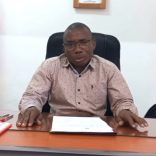Mozambique: Over 500 terrorist attacks recorded by end of august – OCHA | AIM report
Mozambique: Boustani claims Privinvest financed 2014 Frelimo campaign – AIM report

Jean Boustani, a senior sales executive for the Abu Dhabi-based group Privinvest, on trial in New York on charges arising from the scandal of Mozambique’s “hidden debts”, told the court on Wednesday that Privinvest paid millions of dollars to finance the election campaign of the ruling Frelimo Party in 2014.
According to the transcript of the day’s court proceedings Privinvest allocated four million dollars to the Frelimo campaign and another two million to “NUY”. Boustani confirmed that the latter was an alias Privinvest used for Filipe Nyusi, the Frelimo presidential candidate who won the 2014 election and is now President of the Republic.
Boustani said the four million “was a payment to Frelimo Party from Privinvest for the election campaign of upcoming President Filipe Nyusi. The separate payment of two million to “NUY”, he added, was also for Nyusi’s campaign.
Earlier in the trial, agents from the Federal Bureau of Investigation (FBI), told the court they had deciphered most of the nicknames and aliases used by Privinvest, but were unsure about “Nuy”, also referred to as “New Guy” or “New Man”. The FBI had also only been able to track one million of the promised two.
Asked by AIM on Thursday for Frelimo’s response to Boustani’s claims, the Party’s Central Committee Secretary for Communication and Image, Caifadine Manasse, said “we are following the trial”.
He added that Nyusi “remains calm and is following events. He has nothing to do with the question of the debts”.
The Privinvest money given to Frelimo followed a request in 2013 from the then President, Armando Guebuza. According to Boustani’s testimony on Tuesday, when the two men met in Maputo in January 2013, Guebuza said he wanted investment in Mozambique, support for Mozambican security and also “support for the Party”. Boustani did not indicate on Tuesday what kind of support Guebuza had in mind.
The legislation on funding for Mozambican election campaigns is extraordinarily permissive. Parties and candidates are only obliged to account for the money they received from the state budget. There is no requirement to reveal how much they received from private donors.
The law explicitly allows contributions from foreign citizens or NGOs. It only bans contributions from foreign governments or governmental organisations or foreign public companies. Foreign private companies are not mentioned.
Asked on Wednesday about a list of other payments Privinvest had made, Boustani said seven million dollars went to the then finance minister, Manuel Chang, part of which was for his consultancy company, and part for his campaign for election to parliament.
He said two fixers for the contract for Proindicus (the first company to benefit from the “hidden debts”), Teofilo Nhangumele and Bruno Langa, received 8.5 million each.
13 million dollars of Privinvest money was allocated to Gregorio Leao, the then head of the State Security and Intelligence Service (SISE), and 15 million was sent to Antonio do Rosario, the head of SISE economic intelligence, who went on to become chairperson of all three companies involved in the debts – Proindicus, Ematum (Mozambique Tuna Company) and MAM (Mozambique Asset Management).
Deputy finance minister Isaltina Lucas received three million dollars – Boustani claimed some of this was for “a company associated with her brother who was the manager of Maputo port and it was to establish the Mozambique maritime authority”.
This was a case of Boustani deliberately misleading the court or being woefully ill-informed about Mozambique – for there has always been a maritime authority in Mozambique and it did not need to be established in 2014.
Another extraordinary blunder was his description of Armando Inroga as Foreign Minister. In fact, Inroga was Guebuza’s Minister of Industry and Trade. He received a million dollars for what Boustani called an “offset programme”.
Renato Matusse, a political adviser to Guebuza, received “a million dollars for a ruby mine”
At no stage did Boustani admit that any of these payments were bribes or kickbacks. The decision to make the payments, he said, was not his, but was taken by the founder of Privinvest, Iskander Safa. “None of these people ever asked for anything”, he claimed.
He saw nothing wrong with these huge payments. “Every public official in Mozambique has a private business while at the office”, he claimed. “It’s the same in Lebanon, in the United Arab Emirates. It’s like this in the Middle East and Africa. Maybe it is not nice, but it is like this”.
One of the objectives of the payments, Boustani claimed, “is like building relationships, influencing, lobbying, cementing our position there”.
He said the Privinvest payments were comparable to the funding of political campaigns in the United States. “I see that also here in this country companies pay millions and billions of dollars for political campaigns and I’ve seen also where they contribute to Congressmen or senators etc and then in turn they get projects and contracts, so I think it’s exactly the same”.
The judge, William Kuntz, reluctantly acknowledged that it is now unlikely that the trial will finish on Friday, as originally scheduled. The closing arguments of both prosecution and defence have yet to come.
If the trial runs on past Friday evening, the judge ruled, it will resume on 2 December.












Leave a Reply
Be the First to Comment!
You must be logged in to post a comment.
You must be logged in to post a comment.